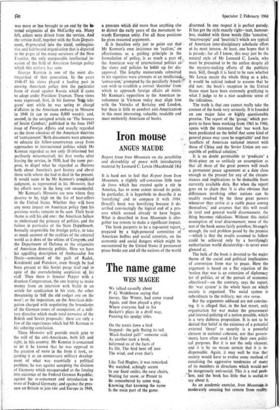Iron mouse
ANGUS MAUDE
It is hard not to feel that Report from Iron Mountain, a slightly self-conscious little tour de force which has created quite a stir in. America, has to some extent missed its point. In particular, it is hyperbole ,to describe it as 'horrifying' and to compare it with 1984. Orwell's book was horrifying because it de- scribed convincingly the logical end of a pro- cess which seemed already to have begun. What is described in Iron Mountain is alto- gether too remote to make a significant impact.
The book purports to be a top-secret report, prepared by a high-powered committee of American boffins and social scientists, on the economic and social dangers which might be encountered by the United States if permanent peace broke out and all the nations of the world
disarmed. In one respect it is perfect parody. It has got the style exactly right—taut, humour- less, studded with those words (like `conative,' 'macroscopic' and `heuristic') which are typical of American inter-disciplinary scholastic effort at its most intense. At least, one hopes that it is parody; for all I know, this may just be the natural style of Mr Leonard C. Lewin, who must be presumed to be the author despite all the mystery-making efforts of the publicity men. Still, though it is hard to be sure whether Mr Lewin meant the whole thing as a joke,
• it would be unkind indeed to assume that he did not: the book's reception in the United States must have been extremely gratifying to what I judge to be a nice academic sense of the ridiculous.
The truth is that one cannot really- take the content of the book very seriously. It is founded on one major false or highly questionable premise. The report of the `group,' which pur- ports to have been working from 1963 to 1966, opens with the statement that 'our work, has been predicated on the belief that some kind of general peace may soon be negotiable' and that 'conflicts of American national interest with those of China and the Soviet Union are sus- ceptible of political solution.' - It is no doubt permissible to 'predicate' a think-piece on so unlikely an assumption as that all three of the great powers will reach a permanent peace agreement at a date close enough to the present for any of the circum- stances and implications to be deducible from currently available data. But when the report • goes on to claim that `it is also obvious that differences involving other nations can be • readily resolved by the three great powers whenever they arrive at a stable peace among themselves,' and assumes that this will result in total and general world disarmament, the thing becomes ridiculous. Without this initial
• assumption of total disarmament, most of the rest of the book seems fairly pointless. Strangely enough, the real problem posed by the premise —which is that the results assumed to follow could be achieved only by a horrifyingly authoritarian world dictatorship—is never even glanced at.
The bulk of the book is devoted to the major theme of the social and political implications of conversion from war to peace. Here the argument is based on a flat rejection of the `notion that war is an extension of diplomacy (or of politics, or of the pursuit of economic objectives)'—on the contrary, says the report, the `war system' is the whole basis on which society is organised. The social system is subordinate to the military, not vice versa.
But the arguments adduced are not convinc- ing. It is alleged that, in the last resort, only organisation for war makes the government and internal policing of a nation possible, which is a very dubious proposition. It is not to be denied that belief in the existence of a potential external `threat' to security is a powerful element in national cohesion, nor that govern- ments have often used it for their own politi- cal purposes. But it is not the only element, and it is by no means certain that it is in- dispensable. Again, it may well be true that society would have to evolve some method, of canalising the aggressive tendencies of many of its members in directions which would -AIM be dangerously anti-social. This is a real prab- nem, and the book has little that is usefuls to say about it.
As an academic exercise, Iron MountaimAs moderately amusing but remote from reaey. It will be some time before we are face to face with most of the problems it discusses and some are unlikely ever to confront us. Above all, one is left with the feeling that the whole approach is typical of all that is wrong with the modern 'expert' approach to society and its human problems. To this extent the satire —if it is satire—is successful. Just as nearly all the careful predictions in this book would break down because of the essential unpre- dictability of people, so the experts are getting things wrong in real life. One wonders whether Mr McNamara's computers, together with the Rand Corporation, Hudson Institute, old Uncle Herman Kahn and all, really forecast back in 1962 that the us would be bogged down with 500,000 men in Vietnam in the Presidential election year of 1968. It might be cheaper and safer just to guess.



































 Previous page
Previous page